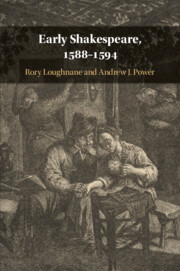Book contents
- Early Shakespeare, 1588–1594
- Early Shakespeare, 1588–1594
- Copyright page
- Contents
- Tables
- Notes on Contributors
- Acknowledgements
- Abbreviations
- Introduction Beginning with Shakespeare
- Chapter 1 Shakespeare and the Idea of Early Authorship
- Chapter 2 Collaboration and Shakespeare’s Early Career
- Chapter 3 The Language and Style of Early Shakespeare
- Chapter 4 Shakespeare’s Early Verse Style
- Chapter 5 Early Shakespeare, Chaucer, and Narrative Theory:
- Chapter 6 Poetry, Counsel, and Coercion in Shakespeare’s Early History Plays
- Chapter 7 John Lyly and Shakespeare’s Early Career
- Chapter 8 Spenser and Shakespeare: Bards of a Feather?
- Chapter 9 Arden of Faversham, Richard Burbage, and the Early Shakespeare Canon
- Chapter 10 Boy Parts in Early Shakespeare
- Chapter 11 The Origins of Richard Duke of York
- Chapter 12 Early Shakespeare and the Authorship of The Taming of the Shrew
- Chapter 13 Who Read What When?
- Book part
- Select Bibliography
- Index
Chapter 1 - Shakespeare and the Idea of Early Authorship
Published online by Cambridge University Press: 17 April 2020
- Early Shakespeare, 1588–1594
- Early Shakespeare, 1588–1594
- Copyright page
- Contents
- Tables
- Notes on Contributors
- Acknowledgements
- Abbreviations
- Introduction Beginning with Shakespeare
- Chapter 1 Shakespeare and the Idea of Early Authorship
- Chapter 2 Collaboration and Shakespeare’s Early Career
- Chapter 3 The Language and Style of Early Shakespeare
- Chapter 4 Shakespeare’s Early Verse Style
- Chapter 5 Early Shakespeare, Chaucer, and Narrative Theory:
- Chapter 6 Poetry, Counsel, and Coercion in Shakespeare’s Early History Plays
- Chapter 7 John Lyly and Shakespeare’s Early Career
- Chapter 8 Spenser and Shakespeare: Bards of a Feather?
- Chapter 9 Arden of Faversham, Richard Burbage, and the Early Shakespeare Canon
- Chapter 10 Boy Parts in Early Shakespeare
- Chapter 11 The Origins of Richard Duke of York
- Chapter 12 Early Shakespeare and the Authorship of The Taming of the Shrew
- Chapter 13 Who Read What When?
- Book part
- Select Bibliography
- Index
Summary
This is an essay about early Shakespeare and loss. It attempts to put some kind of order on a span of several years when Shakespeare is first writing plays, or parts of plays, in a commercial environment with fellow professionals. It discusses a period of time, the mid-to-late 1580s and early 1590s, for which much information about Shakespeare and other working dramatists is lost. It asks, how do you write about that kind of loss? And, what sort of data-sets do you hold up to the blank spaces of those years, knowing only the likelihood of Shakespeare’s activity, to enable plausible deductions about his early working life? It considers how the early canon has been categorized and written about, situates the documentary evidence for Shakespeare’s first forays in writing in the context of surviving evidence about theatrical activity in the 1580s, contextualizes Shakespeare’s overall career in the light of those of his peers, and, finally, considers some of the defining features of Shakespeare’s earliest writings.
- Type
- Chapter
- Information
- Early Shakespeare, 1588–1594 , pp. 21 - 53Publisher: Cambridge University PressPrint publication year: 2020
- 1
- Cited by

